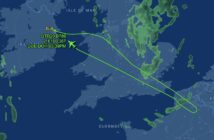- EU says short haul tax benefited Irish airlines
- Ryanair says ruling will require it to pay €12m
- Aer lLingus estimates €4m
Ryanair and Aer Lingus face a bill for €16m in air travel taxes after the European Court of Justice ruled that they had benefited from unlawful aid from the Irish government.
Ryanair said the ruling will require it to pay back €12m. Aer Lingus estimates their tax bill at €4m, of whicht €1m is attributable to Aer Arann which operated Aer Lingus Regional services. Aer Arann, now Stobart Air, was also thought to have a separate liability, an issue is complicated by the fact that the carrier went into examinership after the travel tax was introduced.
The Court of Justice upheld a decision by the European Commission in 2011 that lower air tax rates in Ireland for shorter flights between 2009 and 2011, including on some services to Britain.
Ryanair and Aer Lingus went to the court in Luxembourg after the Commission said Ireland was wrong to set a lower tax rate for short haul flights, €2, rather than €10 on longer flights, in an attempt to let domestic passengers avoid paying taxes.
The Government introduced the controversial air travel tax in 2009 under Minister Brian Lenihan and Department of `fiancé secretary David Doyke. To prevent domestic passengers having to pay the tax a €2 charge was levied per passenger on flights up to 300km, and €10 for distances over that.
The new tax levied a €2 charge per passenger on flights up to 300km from Dublin, and €10 for distances over that.
Oddly it was Ryanair who complained to the European Commission about the two tier rate. Last year, the European General Court overturned the Commission’s ruling. An appeal, on a point or points of law only, may be brought before the Court of Justice against a judgment or order of the General Court.
Ireland modified its air travel tax in 2011 to a flat rate for all flights, domestic and international, following the Commission’s investigation
The court said: “the advantage did not consist in the fact that those airlines were able to offer more competitive prices than their competitors. It resulted quite simply from the fact that those companies had to pay a lower amount than they would have had to pay if their flights had been subject to the standard rate and could have charged €8 more in theory. The difference between the lower and normal rates of the Irish air travel tax constitutes unlawful aid, which must be recovered regardless of the benefit the airlines actually derived from the aid
Ryanair said: “we have been expecting this judgment on Ireland’s illegal Air Travel Tax which now requires Ryanair to pay some €12m to the Irish Government on behalf of passengers who paid the lower €2 tax rate on shorter routes, despite the fact that we did not collect the €10 tax from these passengers. This ruling now clears the way for Ryanair (and other airlines) to pursue our High Court action against the Irish Government to recover the €88m of damages we suffered as a result of being forced to pay this illegal tax.”
Aer Lingus responded: “The state is seeking to recover €4 million, however this is being contested in separate proceedings pending in the Irish High Court against the Irish Government seeking substantial damages for losses flowing from the infringement of the EU rules on free movement of services arising from the Air Travel Tax. Aer Lingus consistently opposed the Air Travel Tax, which damaged the Irish aviation sector and which has since been abolished altogether. Aer Lingus notes today’s judgement overturns the ruling of the General Court which had partially annulled a decision by the European Commission under the state aid rules, relating to the period when the tax was levied at two different rates depending on the route flown. The Commission had required that Ireland recover €8 per passenger from a number of airlines (being the difference between the lower and the higher rate) for each passenger subject to the lower rate. Aer Lingus is studying the judgement in detail to understand fully its implications.




